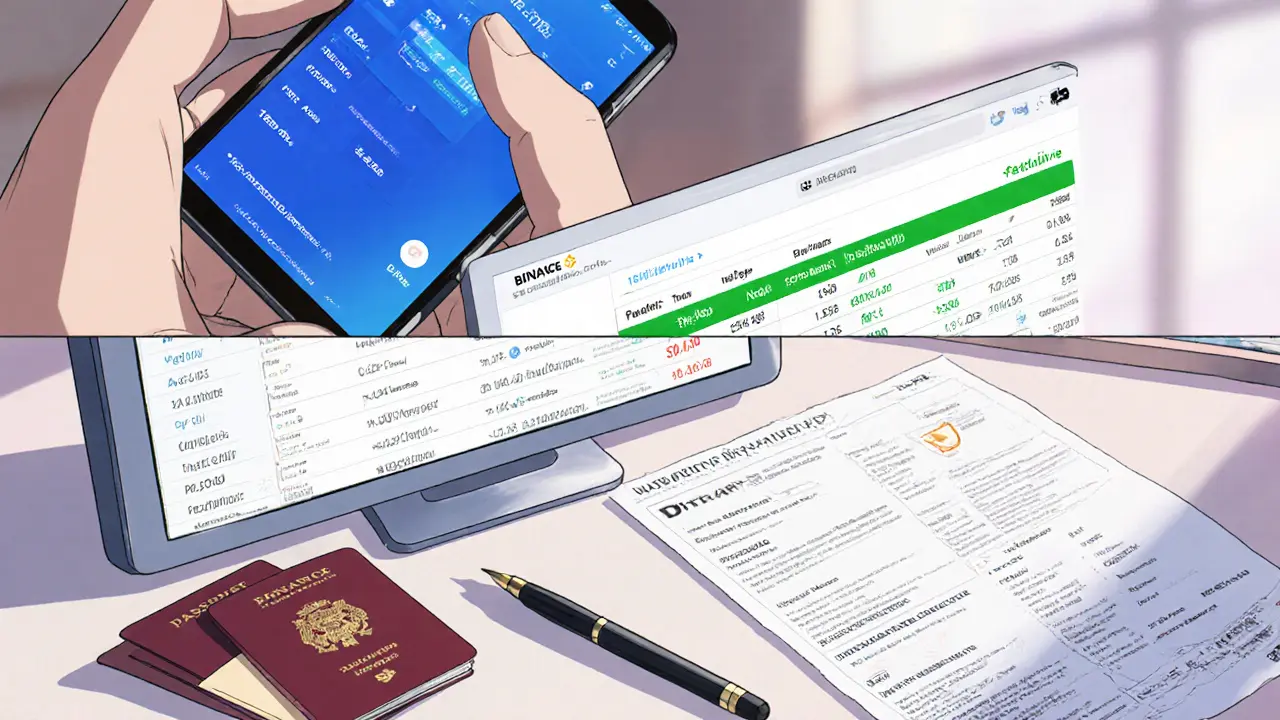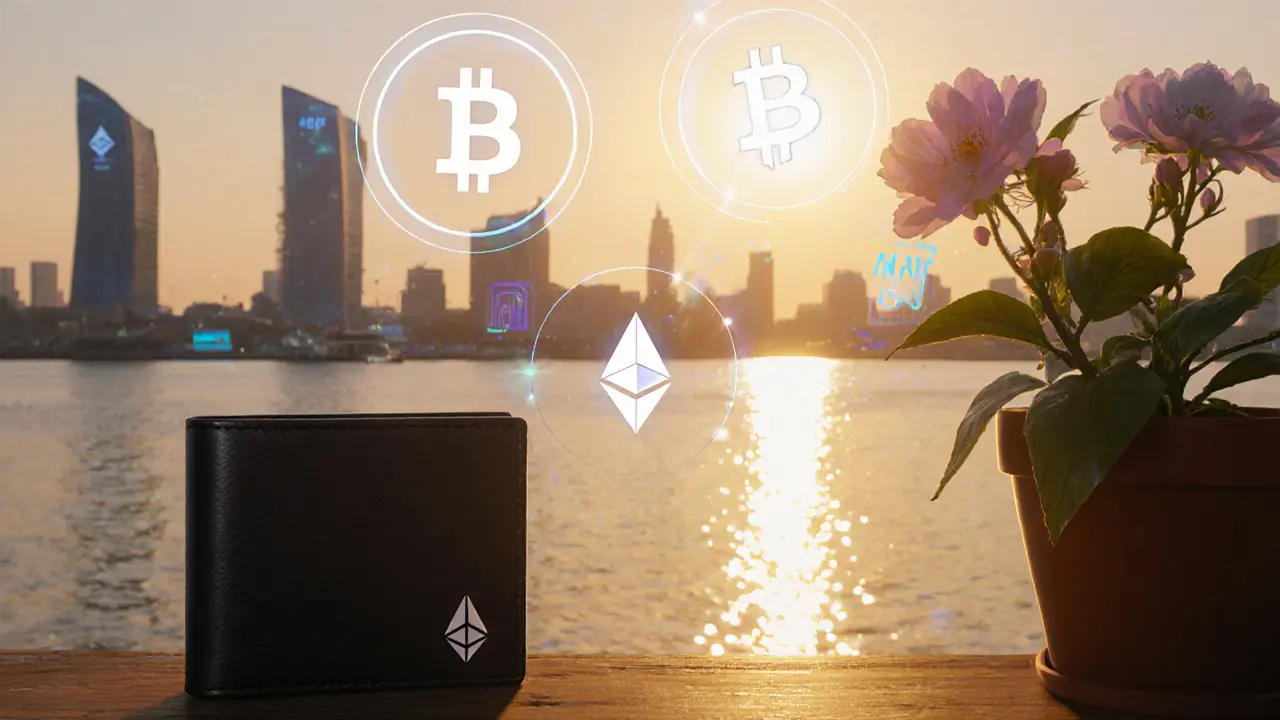Crypto Platform Comparison Tool
Compare the best crypto platforms that accept NGN payments in Nigeria. Filter by payment method, fee structure, and KYC requirements to find the right service for your needs.
Want to turn your Nigerian Naira into Bitcoin, Ethereum or any other digital coin, but aren’t sure where to start? Since the Central Bank of Nigeria (CBN) tightened its grip on crypto in 2021, the market has become a maze of brokers, exchanges and peer‑to‑peer (P2P) platforms. This guide walks you through every move you need to make - from picking a wallet to passing KYC, choosing a platform that actually accepts NGN, and avoiding common traps. By the end you’ll know exactly how to buy crypto Nigeria with confidence.
Regulatory Landscape - What the CBN Really Means for You
Central Bank of Nigeria (CBN) is a government agency that regulates banking and monetary policy in Nigeria issued a directive in early 2021 that barred banks from processing cryptocurrency transactions. The ban does not criminalize owning crypto, but it cuts off the most straightforward fiat‑to‑crypto pipeline - your bank account.
Because of this, Nigerian traders rely on alternative payment rails: direct card integrations, mobile money, and especially P2P marketplaces that match buyers with sellers who accept cash deposits, bank transfers to non‑banking payment processors, or even QR‑code payments.
Regulators are still drafting clearer AML (anti‑money‑laundering) rules, so you’ll see platforms periodically update their KYC requirements. Staying agile - i.e., keeping accounts on two or three platforms - is the safest bet.
Three‑Step Blueprint for Buying Crypto with Fiat
- Pick a crypto wallet. This is where your coins live after purchase. Mobile wallets like Trust Wallet or hardware options such as Ledger are popular. Choose one that supports the tokens you plan to buy.
- Select a platform that accepts NGN. Options fall into three buckets: crypto brokers (e.g., Luno), full‑featured exchanges (e.g., Blockchain.com, Changelly) and P2P marketplaces (e.g., Binance P2P, Bybit P2P, LocalBitcoins).
- Complete KYC and fund the purchase. Most platforms require identity verification - a passport or national ID plus a utility bill. After approval, deposit NGN using the method the platform supports and execute the trade.
Each step is elaborated below.
Choosing a Wallet - Your First Line of Defense
While some platforms (like Binance) offer custodial wallets, it’s wiser to control your private keys. Here are three wallet types you can set up in under ten minutes:
- Mobile wallets - Trust Wallet, MetaMask (mobile). Easy UI, QR‑code scanning for payments.
- Web wallets - MyEtherWallet, Blockchain.com’s non‑custodial wallet. Good for occasional traders.
- Hardware wallets - Ledger Nano S, Trezor Model One. Best for long‑term storage and large balances.
After installing, write down the 12‑word seed phrase on paper and keep it offline. Losing the seed means losing the crypto forever.
Platform Deep‑Dive - Where to Convert NGN into Crypto
Below are the most reliable choices as of October2025, grouped by their core service model.
Crypto Brokers - Simple, Beginner‑Friendly On‑ramps
Luno is a crypto brokerage that lets Nigerians buy Bitcoin, Ethereum and several altcoins directly with Naira. You create an account, verify with a national ID, and then fund via a linked bank card or mobile money. Luno’s fees hover around 1.5% per trade, and the exchange rate is close to the interbank rate, making it a solid starter.
Full‑Feature Exchanges - More Coins, Better Rates
Blockchain.com is a global crypto platform that launched direct NGN support in March2025. Users can deposit NGN instantly and trade Bitcoin, Ethereum, Dogecoin and dozens of others without converting to USD first. The platform’s tiered fees start at 0.6% for market orders and drop to 0.3% for high‑volume traders.
Changelly offers a fiat‑to‑crypto gateway that aggregates offers from several verified providers. It supports Visa/Mastercard, bank transfers and even Apple/Google Pay. For purchases under $150, you can skip the full KYC; larger amounts need a government ID and proof of address.
P2P Marketplaces - Best Rates, More Payment Flexibility
Binance P2P connects buyers and sellers directly. You can filter ads by payment method (bank transfer, Paystack, Flutterwave) and see the exact NGN rate each seller offers. Binance holds the crypto in escrow until the seller confirms receipt of cash.
Bybit P2P focuses on stablecoin pairs (USDT/USDC) but also lists Bitcoin and Ethereum ads priced in NGN. New users enjoy a $20 signup bonus, and the platform provides a built‑in dispute‑resolution team.
LocalBitcoins remains a veteran P2P site that supports cash‑deposit, bank‑transfer and mobile‑money options. Its reputation system (green, yellow, red badges) helps you gauge seller reliability.
OTC Solutions - Fast Cash‑Out, No Buying Feature
Breet is an over‑the‑counter (OTC) platform that lets you sell crypto for NGN instantly into your bank account. While you can’t purchase crypto there, you can pair Breet with a broker to create a full buy‑sell loop.

Comparison Table - Picking the Right Service for Your Needs
| Platform | NGN Support | Payment Methods | Typical Fees | KYC Threshold | Best For |
|---|---|---|---|---|---|
| Luno | Yes (direct) | Bank card, mobile money | 1.5% per trade | Full ID at signup | Beginners seeking simplicity |
| Blockchain.com | Yes (direct) | Bank transfer, card | 0.6% - 0.3% (tiered) | Full ID for >$500 | Low‑fee traders needing many coins |
| Changelly | Via partner offers | Visa, Mastercard, Apple/Google Pay, bank | 0.5% + network fee | None under $150, full ID above | Fast one‑click swaps |
| Binance P2P | Yes (seller‑set rates) | Bank transfer, Paystack, Flutterwave | 0% (trading fee waived) | Basic ID for <$2,000, full ID above | Best rates, wide seller pool |
| Bybit P2P | Yes (seller‑set rates) | Bank transfer, mobile money | 0% (trading fee waived) | Full ID for all trades | Stablecoin‑centric traders |
| LocalBitcoins | Yes (seller‑set rates) | Cash deposit, bank transfer, PayPal | Varies by seller (usually 1-2%) | Full ID for any trade | Trusted community reputation |
| Breet | No (sell‑only) | Bank transfer (auto‑payout) | 0.2% on sell | Full ID at account creation | Fast cash‑out for existing crypto |
Step‑by‑Step Walkthrough Using Binance P2P (Example)
- Create a Binance account and verify your email.
- Navigate to the P2P tab, select “Buy” and filter the list by “NGN” and “Bank Transfer”.
- Choose a seller with a good rating (green badge) and a rate close to the market price.
- Enter the amount of Bitcoin you want, click “Buy”. Binance shows the exact NGN you need to pay.
- Copy the seller’s bank details, then go to your mobile banking app and transfer the NGN.
- Take a screenshot of the transfer confirmation.
- Upload the screenshot in the Binance P2P order page.
- The seller releases the Bitcoin from escrow, and it appears in your Binance Spot wallet.
- Transfer the Bitcoin to your personal wallet (e.g., Trust Wallet) for full control.
This flow works the same on Bybit P2P or LocalBitcoins, only the UI changes.
Tips, Tricks & Common Pitfalls
- Double‑check the exchange rate. P2P sellers often list a “premium” over the market price. Compare their rate to a trusted price ticker (e.g., CoinGecko) before confirming.
- Keep a backup of KYC documents. If a platform asks for additional proof, you’ll be ready.
- Beware of “cash‑only” sellers. They may request you meet in person - only do this if you trust the person and choose a public location.
- Monitor platform notifications. Regulatory changes can cause a platform to suspend NGN deposits temporarily.
- Maintain accounts on at least two platforms. If one gets blocked, you can still move funds using the other.

Security Best Practices
Even though many Nigerian platforms employ escrow, the crypto you receive is only as safe as the wallet you store it in. Follow these rules:
- Activate two‑factor authentication (2FA) on every exchange and your email.
- Never share your private keys or seed phrase with anyone, including platform support.
- Use a hardware wallet for amounts over $1,000 USD equivalent.
- Regularly update your phone’s operating system and security patches.
Future Outlook - What to Expect in 2026
With Blockchain.com’s NGN rollout and growing interest from global exchanges, expect more platforms to add direct naira support, reducing the need for conversion to USD. Regulatory clarity is still a work in progress, but the trend points toward tolerated crypto ownership and more legitimate fiat gateways. Keep an eye on CBN announcements and the emerging “Crypto‑Friendly Banks” that are experimenting with sandbox licences.
Frequently Asked Questions
Can I use my regular bank account to buy crypto in Nigeria?
Direct bank transfers are limited because most banks follow the CBN directive. However, many platforms partner with payment processors that let you fund via a card linked to your bank or through mobile money services that bypass the restriction.
Is crypto ownership illegal in Nigeria?
No. The CBN bans banks from handling crypto transactions, but individuals can legally hold, trade and use cryptocurrencies. The key risk is using unregulated channels that may be targeted by fraudsters.
What’s the fastest way to get Bitcoin with NGN?
P2P platforms like Binance P2P often provide the quickest settlement - funds are released as soon as the seller confirms receipt of your bank transfer, usually within minutes.
Do I need to complete full KYC for small purchases?
Platforms such as Changelly allow purchases up to $150USD without full KYC. For larger amounts, a government‑issued ID and proof of address become mandatory.
How can I protect myself from scams on P2P sites?
Only trade with users who have a green reputation badge, use platform escrow, and verify the bank transfer receipt before confirming the trade. Never send cash outside the platform’s payment flow.


Matthew Homewood
September 29, 2025 AT 21:38Reading through this guide feels like stepping into a well‑mapped hallway after wandering the dark alleys of the Nigerian crypto scene. The author does a solid job of breaking down the regulatory backdrop without drowning us in jargon. I especially appreciate the clear three‑step blueprint that bundles wallet selection, platform choice, and KYC into digestible chunks. It’s a practical approach that aligns well with both newcomers and seasoned traders looking for a refresher.
Shane Lunan
October 3, 2025 AT 14:48Looks like another guide to make us buy more crypto.
Jeff Moric
October 7, 2025 AT 07:58Great effort on covering the spectrum of options-from brokers like Luno to P2P giants such as Binance. It’s helpful to see the fee structures laid out side by side, especially for those of us watching margins closely. The reminder about keeping private keys offline is a vital safety net that many overlook. Keep the community posted as platforms update their KYC requirements; that agility will keep us ahead of the curve.
Bruce Safford
October 11, 2025 AT 01:08The article tries to be helpful but misses the deeper truth about why the CBN is tightening its grip. First, the ban on bank‑mediated crypto is just the tip of the iceberg; they are quietly monitoring every P2P transaction through the telecoms. Second, those “escrow” services on Binance are nothing more than a façade – the platform can still freeze assets if a whistleblower tips off the regulators. Third, the KYC forms you fill out are often fed into a central database that the government can request without a warrant. Fourth, the promise of “stable” fees ignores the hidden spread that brokers like Luno embed in their exchange rates. Fifth, many of the listed payment processors route through offshore entities that can be black‑listed at any moment. Sixth, the guide assumes you have reliable internet, yet outages in Lagos and Abuja can stall a trade for hours. Seventh, the advice to keep multiple accounts is sound, but the reality is that most exchanges share user data via AML consortiums. Eighth, the hardware wallet recommendation is great, but beware that even Ledger’s firmware can be compromised if you buy from unofficial sellers. Ninth, the notion that crypto ownership is not criminalized is shaky; the law is ambiguous and can be retroactively applied. Tenth, the article glosses over the tax implications – the Nigerian government is drafting new crypto tax codes as we speak. Eleventh, the reliance on Paystack and Flutterwave may be short‑lived; they have already faced scrutiny from the central bank. Twelfth, the “no‑fee” claim on Binance P2P ignores the fact that sellers inflate their advertised rates to cover hidden costs. Thirteenth, the suggested use of local banks for deposits is risky – many have already been warned to stop processing crypto‑related transfers. Fourteenth, the community trust scores on platforms like LocalBitcoins are manipulable through fake reviews. Fifteenth, the guide’s optimism about “agility” is misplaced – the regulatory environment is shifting faster than any individual can adapt.
Jordan Collins
October 14, 2025 AT 18:18This guide’s formal tone makes it easy to follow, especially for those accustomed to traditional finance documentation. The inclusion of a comparison table is a pragmatic touch that lets readers quickly gauge which platform suits their needs. I would add that users should also verify the platform’s insurance policies, if any, before committing large sums. Overall, a thorough resource that demystifies the NGN‑to‑crypto conversion process.
Andrew Mc Adam
October 18, 2025 AT 11:28Bravo on the dramatic yet clear walk‑through! The step‑by‑step direction feels like a stage play where each act reveals a new character-wallets, exchanges, and the ever‑mysterious KYC. I love the emphasis on seed phrase security; it’s the hero that saves the day. For newcomers, the suggestion to start with a mobile wallet before graduating to hardware is spot on. Keep the drama alive with real‑world anecdotes, and this guide will become legendary.
Ken Lumberg
October 22, 2025 AT 04:38While the guide is helpful, it’s essential to stress the moral responsibility of using crypto for legitimate purposes. The platforms listed must be vetted for compliance, not just convenience. Users should avoid any service that appears to facilitate illicit activity, no matter how low the fees. Ethical trading protects both the individual and the broader ecosystem.
Blue Delight Consultant
October 25, 2025 AT 21:48In reflecting upon the guide, one discerns a thoughtful balance between technical instruction and regulatory awareness. The author’s methodical exposition respects the reader’s intellect, offering depth without overwhelming detail. It would be prudent, however, to underscore the volatility inherent in crypto assets, a point of philosophical import. Overall, a commendable contribution to the discourse.
Wayne Sternberger
October 29, 2025 AT 13:58Thank you for the comprehensive overview. The stepwise approach makes it easy for beginners to follow, especially the clear distinction between custodial and non‑custodial wallets. Please remember to keep seed phrases offline and never share them. Your guide will surely help many navigate the NGN‑crypto landscape safely.
Gautam Negi
November 2, 2025 AT 07:08Interesting that the guide presents Binance P2P as a panacea, yet the platform’s history of sudden policy shifts suggests caution. While the rates can be attractive, the underlying volatility of the fiat‑crypto pairing often goes unmentioned. I would advise readers to maintain a diversified approach, perhaps splitting trades across Luno and a P2P venue. That way, you’re not putting all your eggs in one regulatory‑prone basket.
Brian Elliot
November 6, 2025 AT 00:18This is a solid primer for anyone looking to dip their toes into crypto from Nigeria. The breakdown of wallet types-mobile, web, hardware-covers the essential security considerations. I also appreciate the tip about keeping accounts on multiple platforms to hedge against potential bans. Keep the updates coming as the market evolves.
Marques Validus
November 9, 2025 AT 17:28Yo, this guide is lit! The low‑code swap flow on Changelly is pure fire, and the P2P escrow vibes on Binance are clutch for getting that NGN into BTC fast. Just watch out for the hidden gas fees-those can eat your profit like a shark. Keep the jargon coming, fam, we love the hustle.
Mitch Graci
November 13, 2025 AT 10:38Wow, another guide about buying crypto in Nigeria??!! 🙄🙄🙄 This is exactly what the world needs-more tutorials about making money while the government pretends to protect us!!! 😂😂😂
Michael Grima
November 17, 2025 AT 03:48Oh great, another step‑by‑step saga that pretends we’re not already drowning in crypto chaos.
Michael Bagryantsev
November 20, 2025 AT 20:38I’m grateful for this detailed walkthrough. It’s reassuring to see the emphasis on security and diversification. As the landscape shifts, having a clear, calm reference point will be invaluable. Thank you for sharing your knowledge with the community.